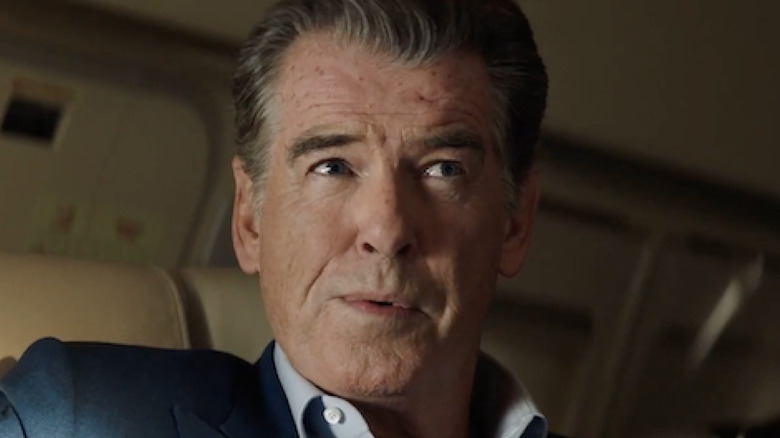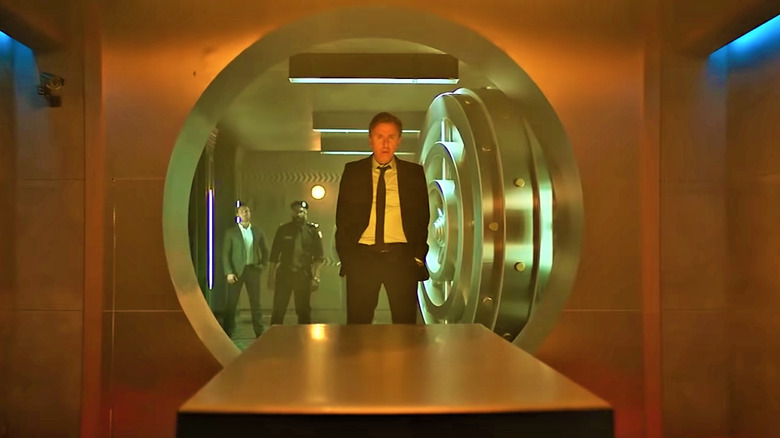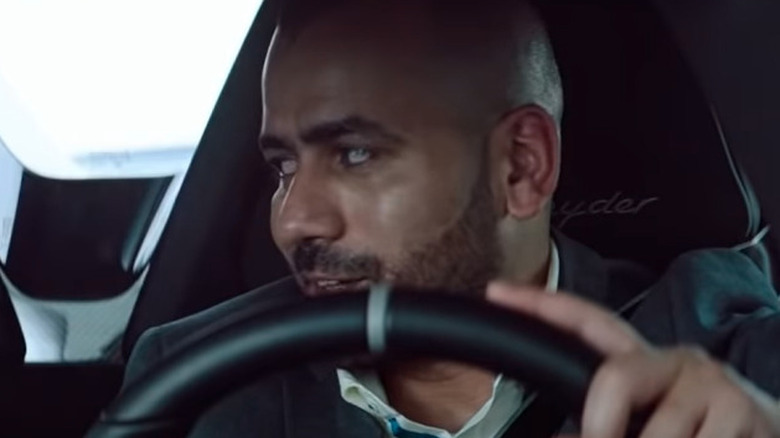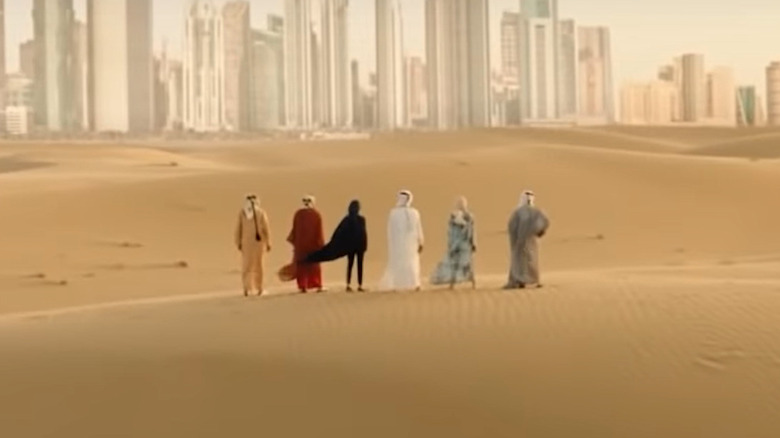The Ending Of The Misfits Explained
Contains spoilers for "The Misfits"
The action film "The Misfits” follows a group of vigilantes who convince prison escape artist Richard Pace, played by Pierce Brosnan, to help them pull off a gold heist in the fictional country of Jazeristan. Their eclectic team includes Thai explosives expert Wick (Mike d Angelo), skilled Korean American fighter Violet (Jamie Chung), Black con artist Ringo (Nick Cannon), and finally the mysterious "Prince," played by Rami Jaber. According to the National, Jaber also serves as an executive producer of "The Misfits," and though the character's background is never clarified, Prince finances the entire caper — pro bono — and donates the stolen gold to the Zaatari Syrian refugee camp.
The gold is originally meant to finance terrorist activities, and a man named Schultz (Tim Roth) is storing the fortune for a terrorist organization in one of his many high-security prisons. Pace's daughter Hope (Hermione Corfield) persuades her father to take on the job, and they hatch a plan to steal their bounty from a Jazeristan penitentiary. Their basic intention is to give the entire prison population severe food poisoning, dress up as medical personnel, then sneak out with the gold.
The cultural sensibilities of "The Misfits" lean heavily into antiquated ethnic, racial, and sexist stereotypes — but we're here to explain the ending, not the film's choices. So let's dive into the multiple twists at the end of "The Misfits."
Diversions as distraction and humiliation
The personal antagonism between Schultz and Richard Pace is obvious from the beginning of the movie due to the heavy implication that Pace previously slept with Schultz's wife. Schultz therefore has a vendetta against Pace, and Pace reciprocates the rivalry by humiliating Schultz whenever possible. This motivation explains the reasoning behind the numerous outlandish diversions and red herrings during the robbery.
First, by giving the entire prison population food poisoning, the team causes hundreds of inmates to suffer intense vomiting and diarrhea. This throws the institution into chaos, and allows the robbers to take advantage of the distracted staff during the pandemonium. However, for Pace, the health of the convicts is simply a means to an end. When Wick expresses concern about their well-being and remarks, "I hope there's no horrible side effects," Pace heartlessly shrugs and responds, "This should be the worst." No matter the collateral damage, Pace's main objective was to embarrass Schultz in his own facility — something that a cavalcade of spewing bodily fluids is sure to do.
Secondly, it's eventually revealed that the gold bars weren't transported as bricks, but instead melted down into the shape of a statue. While Schultz's team chases after a van they presume is carrying the riches, the real gold is wheeled out of the facility under the pretense of repairing the sculpture. This means Schultz is further disgraced when he catches up to the van, only to find it empty.
Prince has the resources to get the job done
Once Schultz does catch the van, our crew is outmanned and outgunned — that is, until a fleet of soldiers with a military aircraft inexplicably emerge from the sand dunes (even though the desert provides them with no cover to hide behind). These men are supposedly under the command of Prince. The regiment surrounds Schultz, claiming to be from the fictional sovereign nation of Salwhan. (Why not? The movie is already taking place in the fictional country of Jazeristan.) Whether this is another trick or Prince is actually royalty in the context of "The Misfits" remains somewhat ambiguous, but the tactic does allow them to leave unharmed.
What isn't ambiguous, however, is that the vigilante thieves condemn Schultz to death by divulging his whereabouts to Abu Hirawa (Mansoor Alfeeli), the head of the terrorist organization they just robbed. As to why Hirawa would punish his lackey in charge of protecting the gold instead of going after those directly responsible for swindling his wealth standing right in front of him, that remains an unanswered question. Even if Hirawa believed that Prince was royalty from a sovereign nation, he doesn't at all care about the status of those who stole his treasure.
For that matter, if the group really was trying to make the world a better place and stop terrorism, why didn't they kill Hirawa right then? They had a literal squadron of soldiers surrounding the area; they could have brought down the head of an international terrorist organization and destabilized his entire establishment. They already displayed that they're not above murder, as Violet has killed a number of guards during the course of the film, so why not one more death for the cause?
A plot full of curveballs
For the final bait-and-switch of "The Misfits," Schultz's goons are holding Hope hostage, and just as she's about to be executed, it's revealed that Violet was the one being held captive and slays her abductors with ease. How these kidnappers mistook a blonde white woman for a brunette Korean American is another unsolved mystery. (Were they not given a general description? Or a photo from her Instagram?) Similarly, in the penultimate scene of the movie, it appears that Richard Pace has gone back on his word and stolen the gold for himself, but he returns to the team remorseful, gilded statue in tow.
When watching "The Misfits," the audience is in the same shoes as Schultz. Due to the many false trails the script sets up, it's easy to become just as confused about what's going on as those being robbed. Though one or two plot twists can be exciting, too many curveballs tend to result in whiplash. But that's the narrative's entire intention: to keep us on our toes, throwing us from point to point, and keep us constantly guessing. Mission accomplished.



